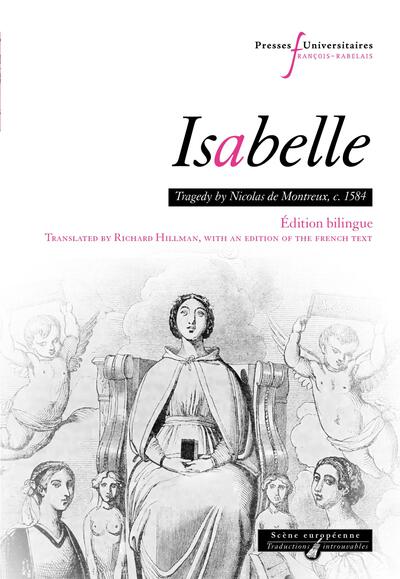
Isabelle - Tragedy by Nicolas de Montreux, c. 1584 édition bilingue
Auteur(s) Hillman (A01)
Editeur(s) RABELAIS
Collection(s) Scène européenne
Ean :
9782386050046
Date de parution :
20/02/2025
Résumé :
Nicolas de Montreux (1561?-1608?), little known today, was a prolific and widely diffused author in a wide range of genres, including drama. Evidence exists that Isabelle was the earliest of his three surviving tragedies, in print by 1584, although extant copies derive from the version annexed to a volume of his popular “bergeries” published in 1595. The question of date is particularly to the point, given the possibility, cautiously explored in this volume’s Introduction, that the play may have contributed to the formation and evolution of Shakespeare’s work at an early stage.
Beyond question is Isabelle’s participation in the vogue for Italianate romance literature that strongly influenced Elizabethan writing generally. Exceptionally for a French “humanist” tragedy of the period, its plot and main characters are adapted from an episode in Ariosto’s enormously popular epic Orlando Furioso featuring a confrontation between the lustful Moor Rodomonte and his beautiful captive Isabella. Within a framework drawing eclectically on far-flung elements of Ariosto’s vast poem, Montreux converts his source’s sensational plot and schematic morality into a study in tragedy precocious for its time and place. Isabelle anticipates his later heroines, Cleopatra (c. 1592) and Sophonisbe (1601), in choosing death as a means of self-affirmation. More remarkably, the boastful and violent Rodomont himself becomes a pitiful victim of the destructive forces he has set in motion.
In addition to a full Introduction and annotated verse translation, this volume offers the first edition of the French text since the late sixteenth century.
Ce volume propose une traduction en vers annotée, accompagnée d’une riche introduction et de la première édition en français depuis la fin du xvie, d’une tragédie qui a peut-être contribué à la formation et à l’évolution de l’oeuvre de Shakespeare.
Disponible, expédié sous 2 à 6 jours
28.00 €
